David Trimble: Bill Clinton hails him a leader of courage
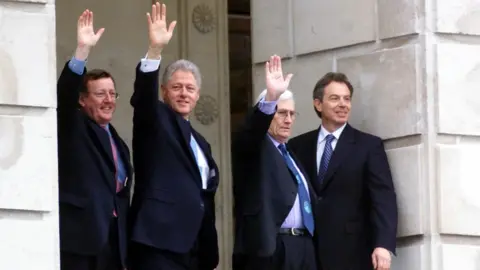 PA/Chris Bacon
PA/Chris BaconFormer US President Bill Clinton has paid tribute to former Northern Ireland first minister Lord Trimble, calling him a "leader of courage and vision".
And former prime minister Sir Tony Blair said without David Trimble, the Good Friday Agreement would not have been possible.
Lord Trimble died on Monday aged 77. He was instrumental in the negotiation of the 1998 Good Friday Agreement.
This was the peace deal which ended the worst of Northern Ireland's Troubles.
Lord Trimble led the Ulster Unionist Party (UUP) between 1995 and 2005.
He won the Nobel Peace Prize, along with Social Democratic and Labour Party (SDLP) leader John Hume and was the first person to serve in the role of first minister in the new Northern Ireland Executive established as part of the Good Friday Agreement.
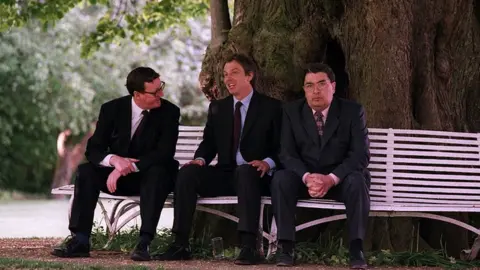 Pacemaker
PacemakerSince 2006, Lord Trimble sat in the House of Lords.
In recent years, he was vocal in his opposition to the Northern Ireland Protocol - part of the 2019 Brexit deal that keeps Northern Ireland in the EU's single market for goods, preventing a hard border with the Republic of Ireland.
Lord Trimble argued that it put the Good Friday Agreement at risk.
Assembly members look set to be recalled to Stormont next week to mark the death of the former first minister.
They will be able to pay tribute to him at a special sitting on Tuesday.
Lord Trimble's funeral is due to take place in Lisburn on Monday
Books of condolence are being opened by a number of councils in Northern Ireland.
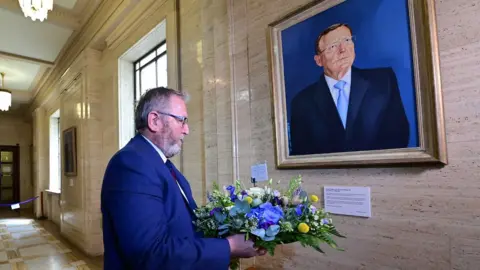 PAcemaker
PAcemakerIn a statement, President Clinton said he and his wife were "deeply saddened" by Lord Trimble's death, saying his "lifetime of service helped bring peace to Northern Ireland".
"Time after time during the negotiations that led to the Good Friday Agreement, he made the hard choices over the politically expedient ones because he believed future generations deserved to grow up free from violence and hatred.
"His faith in the democratic process allowed him to stand up to strong opposition in his own community, persuade them of the merits of compromise, and share power with his former adversaries. His legacy will endure in all who are living better lives because of him today."
Lord Trimble's political journey took him from a young hardliner in the 1970s to a unionist leader who compromised to help deliver an executive and assembly at Stormont where unionism and nationalism shared power.
He received much praise for helping to bring to an end to decades of violence in Northern Ireland.
Sir Tony said Lord Trimble's contribution to the peace process was "immense".
"It was a masterclass in leadership," he told BBC's Radio Four's Today programme. "He saw the chance of being able to settle the issue on terms that were acceptable to unionism.
"He was never in any doubt that he was going to be accused of betrayal. He paid the political price for that."
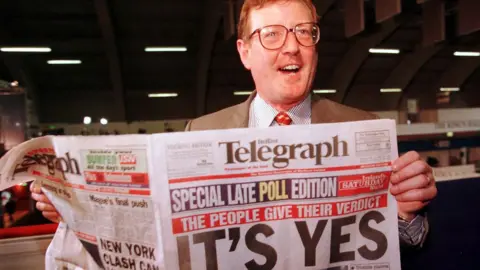 Pacemaker
PacemakerSir Tony said Lord Trimble's vision for Northern Ireland was of "a Northern Ireland healed and brought together in peace".
"Once he said he would do something, he did it, that was absolutely invaluable to the trust needed to make the process work."
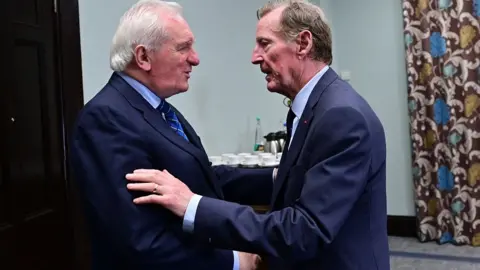 Pacemaker
PacemakerFormer Taoiseach (Irish PM) Bertie Ahern, who led the Irish government at the Good Friday Agreement negotiations, said Lord Trimble was courageous and that although they had "many a row, many arguments", they were able to laugh about that in later years.
"We got on very well. We had lots of one-to-one conversations," he told the BBC's Good Morning Ulster programme.
"Of course we fought, of course we had differences and some of them were fiery. There's no use saying they were not. But we always kept negotiating and dealing with the issues in front of us.
"The reality is, in his time as first minister, with the up and downs and suspensions in the institutions, he stuck with it."
Gerry Adams, the Sinn Féin leader at the time of the Belfast Agreement, said that although he and Lord Trimble had fundamentally different opinions, he always believed the then UUP leader was committed to the peace process.
"David's contribution to the Good Friday Agreement and to the quarter century of relative peace that followed cannot be underestimated," Mr Adams said.
Current UUP leader Doug Beattie described Lord Trimble as a "political giant".
"David Trimble was a man of courage and vision. He chose to grasp the opportunity for peace when it presented itself and sought to end the decades of violence that blighted his beloved Northern Ireland," Mr Beattie said.
 Pacemaker
Pacemaker"The bravery and courage he demonstrated whilst battling his recent illness was typical of the qualities he showed in his political career, at Stormont and at Westminster."
'Giant of politics'
Prime Minister Boris Johnson described Lord Trimble as "a giant of British and international politics".
"[He] will be long remembered for his intellect, personal bravery and fierce determination to change politics for the better," Mr Johnson added.
Current Taoiseach Micheál Martin said Lord Trimble played "a crucial and courageous role in bringing peace to Northern Ireland".
Sinn Féin vice-president Michelle O'Neill said Lord Trimble's courage in helping negotiate the agreement "leaves a legacy a quarter century on for which he and his family should be rightly proud".
Democratic Unionist Party (DUP) leader Sir Jeffrey Donaldson said the former first minister "made a huge contribution to Northern Ireland, and to political life in the United Kingdom" and was a "committed and passionate unionist who always wanted the best for Northern Ireland".
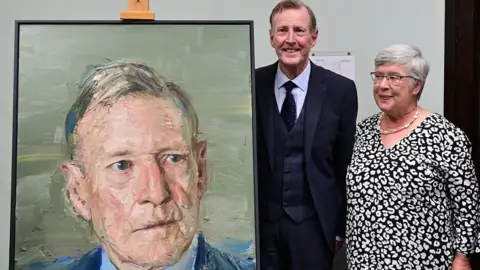 PAcemaker
PAcemakerSir Jeffrey's disagreements with Lord Trimble over the Good Friday Agreement led to him quitting the UUP in 2003 and defecting to the DUP.
"Whilst our political paths parted within the Ulster Unionist Party, there can be no doubting his bravery and determination in leadership at that time," Sir Jeffrey added.
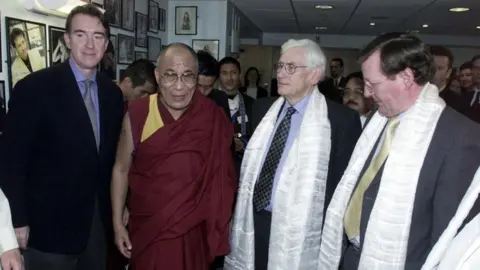 Pacemaker
PacemakerFormer prime minister Sir John Major, said: "When David Trimble became leader of the Ulster Unionist Party, he made a critical contribution to the Northern Ireland peace process.
"He shed his former opposition to the process, and became an innovative advocate for a peaceful settlement.
"He thoroughly merits an honourable place amongst peacemakers."
But Lord Trimble also came in for sustained criticism from others within political unionism for signing up to the Good Friday Agreement, particularly the DUP.
He was criticised for agreeing a deal which allowed Sinn Féin - the political wing of the IRA - to enter into the devolved government while the IRA had not decommissioned its weapons.
In 2005, he lost his House of Commons seat to a DUP challenger and went on to enter the House of Lords where he sat as a Conservative Party peer.
Alliance Party leader Naomi Long said the Good Friday Agreement was Lord Trimble's greatest legacy.
"His contribution to the peace process and the ending of violence in our society helped secure his place in history," she said.
Labour party leader Sir Keir Starmer described him as a "towering figure of Northern Ireland and British politics".
